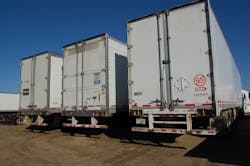CARB greenlights new GHG trailer rules
By Kevin Jones, Trailer Body Builders
The California Air Resources Board (CARB) recently approved new greenhouse gas regulations (GHG) for medium- and heavy-duty vehicles that largely align with federal Phase 2 GHG standards. Truck and engine makers, along with trucking industry representatives, supported the initiative and cited the need for uniform national standards.
Yet if Trump administration follows through on plans to reconsider the Phase 2 standards for trailers and gliders, California plans to keep pressing ahead with its own model year 2020 implementation date, and would possibly expand the scope of the rule, per comments made by CARB staff during a Feb. 8 hearing.
Additionally, the unanimous passage of the California Phase 2 GHG standard and proposed amendments to the current Tractor-Trailer GHG (TTGHG) regulation opens the door for other states to follow with rules of their own.
Mentioned but not discussed, however, was the possible need for a federal waiver under the Clean Air Act to enact the new standards—a privilege unique to California, and an important tool in the state’s implementation of aggressive environmental programs. But, in the ongoing effort to roll back fuel efficiency for cars and trucks, Environmental Protection Agency (EPA) Administrator Scott Pruitt has hinted that if California is unwilling to negotiate, waiver requests could be blocked.
In presenting the proposal, CARB representatives emphasized that the state agency had worked closely with the Obama administration’s EPA and NHSTA in developing the federal rule, in anticipation of “harmonizing” the state requirements. But the CARB staff is “very concerned” about Pruitt’s promise to reconsider the trailer and glider provisions, with CARB’s Mitzi Magtoto calling such a review “unfounded and arguably illegal.”
[To read the full history of CARB’s battle to establish its own GHG standards for trailers, visit Trailer Body Builders.]
“The stay of the trailer requirement does not affect California’s authority to establish standards for trailers,” Magtoto said. “Whether the EPA rescinds to the Phase 2 trailer requirements or not, CARB plans on implementing the California Phase 2 trailer certification requirements and TTGHG rule.”
Among the significant differences in the state rule, truck, engine, and trailer manufacturers must certify separately in California, meaning the new rule drops the current “deemed to comply” allowance for EPA certification. However, CARB is working on an expedited certification option that could streamline upfront certification in exchange for in-use data.
Magtoto also noted approval of the regulation “sets stage for future actions” to meet GHG reduction goals.
Indeed, to make up the potential “loss in benefits” from the rule due to uncertified trailers coming from out-of-state, CARB next year expects to expanding the applicability and increase the stringency of the TTGHG rule for any fleets that travel in California.
In a joint comment filed ahead of the hearing, the American Trucking Associations and the California Trucking Association expressed support for the proposal.
“Given the interstate nature of trucking, national consistency in regulatory approaches is critical. It is both unwise and unhealthy for the nation’s economy and the movement of the nation’s freight to have a patchwork of state and federal tailpipe and fuel consumption standards for trucks,” the filing said.
But in testimony during the hearing, Mike Tunnell, ATA’s director of environmental affairs, expressed concern about “California-only” provisions and the rising cost of new tractors and trailers, and how these costs are impacting fleet modernization in the state. Likewise, the enactment of additional regulatory requirements and enforcement disparities are impacting the economic viability of the state’s trucking industry.
The Phase 2 rule adds about $12,000 to the cost of a tractor and more than $1,000 to the cost of a trailer, he noted.
